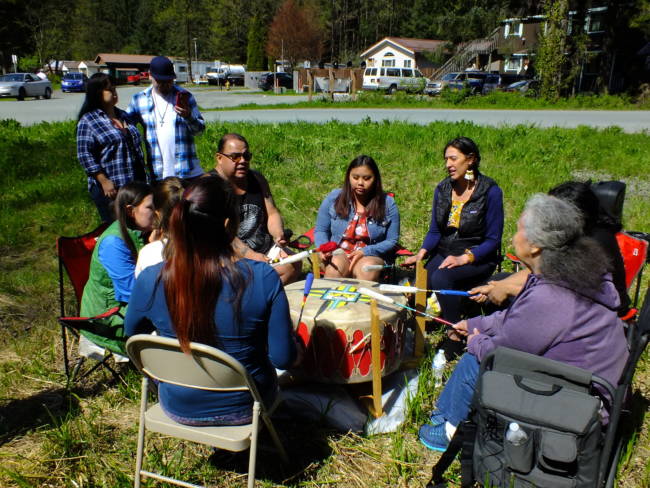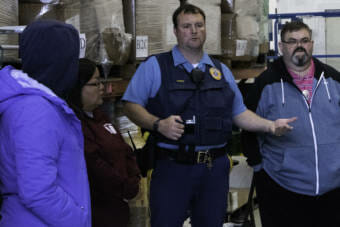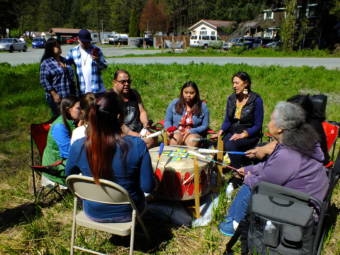
On May 16, Geraldine “Gerry” Nelson went missing in Juneau.
For several days, dozens of volunteers looked for her. They posted on social media, put up signs and organized with local law enforcement and Alaska State Troopers.
Barbara Cadiente-Nelson, a volunteer in the search party, asked the Alaska State Troopers on May 21 about whether a Silver Alert was sent out.
“Despite the communication and despite the effort, there are still people who are unaware that we have an elder that’s missing,” Cadiente-Nelson said. “And I have never received a Silver Alert. And the people I’ve spoken to have not either.”
According to the Silver Alert archive, the alert for Geraldine Nelson was active from May 17 at 10:37 p.m. until she was found dead on May 21.
But people said they never got one. One of those people was Nelson’s grandson, Preston Nelson. He had never even heard of a Silver Alert until Barbara Cadiente-Nelson asked about them.
Silver Alerts are meant to help the public locate vulnerable adults who go missing, like Preston Nelson’s grandmother who had dementia.
Nelson was able to get word out during the search for his grandmother through the Facebook group Juneau Community Collective. And though the group has about 18,000 members, not everyone in Juneau is a part of it.
When he asked the Facebook group if they got a Silver Alert for his grandmother, almost 100 people commented. Most of them said “no.” And there was a lot of confusion about how they would get the Silver Alert.
Nelson now has a lot of questions about how these alerts work.
“Basically, how does the system work?” he asked. “How should it work? Why didn’t it work when they sent an activation?”
A lot of people seem to think Silver Alerts are sent to their phones. But it turns out that’s a completely different system from Silver Alerts.
Tom Mattice, Juneau’s Emergency Program Manager, was in Anchorage before, and he had a Silver Alert sent to his phone. He thought that would happen in Juneau too, but it did not. So he went to the Alaska State Troopers to find out why. They manage the Silver Alert system.
He asked the Alaska State Troopers if Silver Alerts trigger the Wireless Emergency Alert system. WEA is what sends out emergency notifications to people’s phones.
Mattice got different responses to the question. At first, Alaska State Trooper Nicholas Zito said that, WEA should have been activated for Geraldine Nelson. But in an email a week later, Zito said that Silver Alerts do not trigger WEA.
“I honestly don’t know the answer to whether it is standard protocol for the Troopers to trigger WEA for Silver Alerts or not,” Mattice said.
The Silver Alert website isn’t helpful in clarifying this either, since there is no mention of WEA at all.
After that meeting, Mattice said he wants to look more into whether Silver Alerts work as intended.
“And then we have the ability to forward that up to the state’s Emergency Communications Committee and request that this be potentially reviewed, revised, or changed,” he said.
Mattice said that triggering WEA — sending a message to everyone’s cellphones for every Silver Alert — may not be the answer.
“But I think that having the ability to trigger WEA around those individual alerts actually has the potential to create amazing additions to response,” Mattice said. “So we definitely need to have the ability to trigger WEA if and when the shoe fits. The question is, when is that correct and appropriate?”
Silver Alerts are not a phone notification, at least not in Alaska, according to the Alaska State Troopers.
Some other states, including Arizona and Wisconsin, have the ability to send phone notifications for Silver Alerts. But they aren’t using WEA, and if they are — it’s only in very specific situations that meet the federal criteria for activating that wireless system.
In Alaska, WEA is only triggered for presidential alerts, severe weather alerts and AMBER Alerts. Alaska State Trooper Public Information Officer Austin McDaniel explained why AMBER Alerts get phone notifications and Silver Alerts don’t.
“A Silver Alert is usually, not all of the time, but usually not a kind of criminal nexus involved in it. Which is the difference between an AMBER Alert, which is for a child, under that criminal nexus is the child abduction,” McDaniel said.
This is the case for all cities in Alaska but Anchorage. Troopers say Anchorage police handle their own Silver Alerts and can choose to go outside the automated statewide system and broadcast alerts to a wider audience – like Mattice’s text message. Juneau police, however, need to go through the Troopers to issue a Silver Alert.
Generally, people can find Silver Alerts on social media pages, through an email list or through TV and radio broadcasts.
But those TV and radio broadcasts aren’t mandatory. And, it is not clear whether those emails automatically go to local media organizations. According to the state’s Silver Alert plan, they’re supposed to have an email list specifically for the media. And then media can share those alerts on their broadcasts.
But KTOO doesn’t appear to be on an email list. Troopers couldn’t confirm if we were on it.
And in an email, Trooper Public Information Officer Austin McDaniel said they don’t have a media list at all. He said it is local law enforcement’s job to keep local media informed.
Nelson is frustrated with this system. He wants the Silver Alerts to reach more people. And he thinks they should be automatic, not something you voluntarily sign up for.
“Not everyone is checking their email throughout the entire day looking for these alerts,” Nelson said. “A text message, you know, it dings and you look at your phone. It’s instantaneous, rather than, you know, opening your email a day later like, ‘Oh, this person went missing last night? I didn’t know.’”
Just last month, Nelson helped in locating another elder in Juneau who went missing.
Nelson was in the parking lot of Fred Meyer looking at his phone when he saw the Juneau Police Department post a picture of Karen Harris on Facebook asking Juneau residents to keep an eye out for her.
He shared the post to Juneau Community Collective and immediately left to search for her.
“She was about five years younger than my grandma was, so. The community of Juneau came out for me and so I decided to help with this situation,” Nelson said.
He was able to find her safe within a couple of hours. Afterward, Nelson commented on his post with some questions.
“But what if I didn’t see that JPD post? What if I didn’t have a Facebook account?” he asked.
His next step is contacting his state representatives to change the Silver Alert system. He does not want what happened with his grandmother to happen to anyone else.
To sign up for Silver Alerts, you can visit silveralert.alaska.gov.
This story has been updated to clarify the difference between the state’s Silver Alert program, the Wireless Emergency Alert system and how Anchorage alerts its residents when someone is missing.



